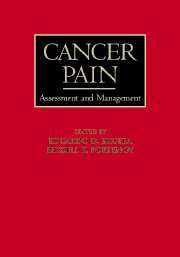Book contents
- Frontmatter
- Contents
- List of contributors
- Preface
- SECTION I MECHANISMS AND EPIDEMIOLOGY
- SECTION II ASSESSMENT AND SYNDROMES
- SECTION III PHARMACOLOGICAL TREATMENT
- SECTION IV NONPHARMACOLOGICAL APPROACHES
- SECTION V THE ROLE OF ANTINEOPLASTIC THERAPIES IN PAIN CONTROL
- SECTION VI PAIN IN SPECIAL POPULATIONS
- 18 Cancer pain management in the chemically dependent patient
- 19 Cancer pain in children
- 20 Cancer pain in the elderly
- SECTION VII DIFFICULT PAIN PROBLEMS
- SECTION VIII SPECIAL TOPICS
- Index
18 - Cancer pain management in the chemically dependent patient
from SECTION VI - PAIN IN SPECIAL POPULATIONS
Published online by Cambridge University Press: 08 October 2009
- Frontmatter
- Contents
- List of contributors
- Preface
- SECTION I MECHANISMS AND EPIDEMIOLOGY
- SECTION II ASSESSMENT AND SYNDROMES
- SECTION III PHARMACOLOGICAL TREATMENT
- SECTION IV NONPHARMACOLOGICAL APPROACHES
- SECTION V THE ROLE OF ANTINEOPLASTIC THERAPIES IN PAIN CONTROL
- SECTION VI PAIN IN SPECIAL POPULATIONS
- 18 Cancer pain management in the chemically dependent patient
- 19 Cancer pain in children
- 20 Cancer pain in the elderly
- SECTION VII DIFFICULT PAIN PROBLEMS
- SECTION VIII SPECIAL TOPICS
- Index
Summary
The challenge
Substance abuse and addiction are difficult problems both theoretically and clinically in pain management and palliative care. Cancer patients with histories of substance abuse are often seen by palliative care specialists, especially in community-based settings. Whereas concurrent drug abuse is problematic, there is the additional problem regarding the diagnosis and understanding of the less obvious aberrant drug-taking behaviors sometimes in evidence in the treatment of patients without formal psychiatric histories of substance use disorders. Such aberrant drug-taking behavior can be manifest, for example, when a patient with advanced disease and pain is unilaterally escalating drug doses, is using medications to treat other symptoms, or when prescriptions are being mishandled. The clinician is challenged to understand such circumstances and plan interventions accordingly. Once these aberrant behaviors are identified the clinician must decide on a course of action that is fair and in the best interests of the patient as well as his or her own career. Thus, the problem of chemical dependence and drug abuse spans a continuum from formal psychiatric disorders to problematic behaviors in the absence of these disorders.
With the pressure of regulatory scrutiny and our duty to treat pain but contain abuse or diversion, clinicians often think that they must avoid being duped by those abusing prescription pain medications at all costs. Thus, although the differential diagnosis of aberrant drug-related behavior is complex, clinicians tend to simplify the assessment of this issue to either addiction or not addiction. It is important to note, however, that the clinician attempting to diagnose the meaning of aberrant drug-related behaviors during pain management may not be correct in the final assessment.
- Type
- Chapter
- Information
- Cancer PainAssessment and Management, pp. 331 - 342Publisher: Cambridge University PressPrint publication year: 2003
- 1
- Cited by



